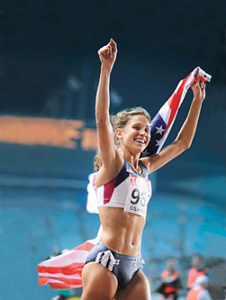By Rachel Berman RD, Director of Nutrition for CalorieCount.com
DietsinReview recently interviewed the dietitian team of the Olympics and they found that many athletes aren’t aware of the amount of calories they are consuming. Calorie counting is not just relevant for weight loss. The more strenuous a sport, the more calories an athlete needs to refuel their bodies and muscles properly for the work they are doing. In addition, it’s not as though an athlete can just copy the diet of someone else on the team. Calories burned at rest and during exercise depend on age, height, weight, body composition, among other factors. Therefore, it’s important for an athlete to get an idea for the amount of calories they burn off personally so that they can consume that much in their diets. If not getting enough or proper nutrition, athletes can definitely put their energy, endurance and game at risk.
We know of at least one Olympian who is well aware of the calories he is consuming. Gold medal swimmer Michael Phelps has been reported to eat as much as 12,000 calories per day to match the 50 miles he swims per week during training. It is more than calories that count – getting enough complex carbohydrates from sources such as grains, legumes, and starchy vegetables help give athletes the energy they need during strenuous activity.
So what does this mean for you? Chances are you are not an Olympian but may be active in your everyday life. It is important for you also to make sure you are not depriving your body of the nutrients it needs even if you are trying to lose weight. If you consume too few calories, especially with an active lifestyle, you run the risk of actually slowing down your metabolism and lacking energy when you need it most.
How do you know how many calories you need to eat every day? One of the more accurate equations is the Mifflin – St Jeor where you need to input your weight in kilograms and your height in centimeters:
Male: BMR = 10×weight + 6.25×height – 5×age + 5
Female: BMR = 10×weight + 6.25×height – 5×age – 161
Then you multiply this number by a general activity factor to get your caloric needs for the day:
- 1.200 = sedentary (little or no exercise)
- 1.375 = light activity (light exercise/sports 1-3 days/week)
- 1.550 = moderate activity (moderate exercise/sports 3-5 days/week)
- 1.725 = very active (hard exercise/sports 6-7 days a week)
- 1.900 = extra active (very hard exercise/sports and physical job)
If you don’t want to do the calculations yourself, feel free to use Calorie Count’s handy tool which takes into account if you want to lose, gain, or maintain your weight. While it is ultimately important to know an average of the calories you need, it’s also key to have a balance among nutrition – complex carbohydrates, lean protein, and heart healthy fat. This helps you pay closer attention to your physical hunger cues and what your body needs to fuel for the competition in your life.
Also Read:
US Olympic Swimmer Natalie Coughlin Talks Health and Fitness
Olympic Swimmer Janet Evans Uses the FlexBelt
image via Self.com
